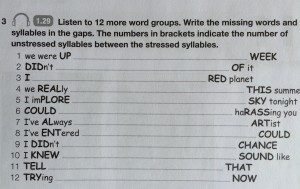Evidence no. 7: Hancock and McDonald
This is a follow-on page related to my blog ‘Listening Cherry 08’ here. I was doing this task, without looking at the answer key, and I could not do no. 6 (see image below), which required me to listen to a speech unit which contained nine syllables going at 5.0 syllables per second, and fill in the gaps between ‘COULD’ and ‘haRASSing you’.
Here is the recording.
On the third or fourth listening, I was still unsure about what to write. And I suddenly realised that this was a wonderful moment (where there is disagreement and uncertainty, there is a learning opportunity). Wonderful because I (native-speaker/expert listener) found myself in a situation where learners often find themselves – having to process a fleeting memory of a mush of sounds.
So I thought to myself I will do what my students often do, and what John Field reports them doing: write down what I think I hear, even though it results in nonsense. And I wrote:
COULD be idle mass haRASSing you
I then looked up the answer key and found
COULD be like almost haRASSing you
So I had heard the syllables ‘like almost’ as ‘idle mass’, resulting in nonsense – the sound substance of this speech unit must have been sufficiently ‘mushy’ to warrant my (nonsensical) decoding. And indeed I believe learners are every often in this situation despite the fact that they have had (in a ‘good’ listening lesson), a lot of contextualisation, and much more of the recording to listen to, and have had more time to acclimatise/normalise to the voice and the ambient acoustic. (The authors, Mark and Annie, provide systematically for this type of acclimatisation making frequent use of ‘tuning in’ exercises – but I hadn’t done this for this recording).
As I write, the experience of being unable to make sense of the mush lies two weeks in the past. And as I listen back to the recording, knowing what the answer is, I cannot conceive or imagine how I can have been so bamboozled by the mush. It seems impossible to me now, that I should have perceived the words ‘idle mass’ – I am tempted to think that perhaps my brain had an off-day. But what I know intellectually is that my knowledge of the answer primes my perception, and locks me into one interpretation, and locks out all others.
But at the time of doing the exercise, my expert-speaker contextualising skills had been neutralised, and I was confronted by raw mush. And this raw mush was sufficiently blurred that I could not make sense of it. More on this another time.
I try below to explain, phonetic-phonemically, how the sound substance (the indeterminate acoustic blur) led me to ‘idle mass’.
I think this is how I perceived the sound substance in order to arrive at ‘idle mass’. I must have heard …
- the |l| of ‘like’ as |j| – so the two vowels of ‘be like’ were heard as ‘bee-eye’ with a glide in between – thus giving ‘be i…’
- the |k| of ‘like’ as a glottal stop |ʔ| which I perceived as |d| – thus giving ‘be id…’
- the |ɔːl| of ‘almost’ as syllabic ‘l’ |l̩| – thus giving ‘be idle’
- the vowel of the second syllable of ‘almost’ which is close to schwa, as |æ| – thus giving ‘be idle mass’
- (the final consonant |t| of ‘almost’ is elided – so for me the two words sounded like ‘idle mass’)

